How to use the ocean in the fight against climate change
German Federal Minister Robert Habeck informed himself about research at GEOMAR
Robert Habeck, German Federal Minister for Economic Affairs and Climate Action and Vice Chancellor, informed himself about climate protection and climate-neutral energy supply during a visit to the Schleswig-Holstein state capital Kiel today. At GEOMAR Helmholtz Centre for Ocean Research Kiel, he discussed ocean-based approaches for climate change mitigation with Director Professor Dr. Katja Matthes, Professor Dr. Andreas Oschlies, Head of the Research Unit Biogeochemical Modelling, and Professor Dr. Klaus Wallmann, Head of the Research Unit Marine Geosystems, as well as additional GEOMAR researchers. The minister was particularly interested in GEOMAR's work on possibilities for carbon capture and storage (CCS) in the seabed and the use of limestone for alkalinisation and mitigation of ocean acidification, another effect of carbon dioxide uptake in the ocean.
The researchers stressed that a decision for CCS cannot mean “business as usual”. “The ultimate goal must be to drastically reduce our emissions," emphasises Professor Dr. Andreas Oschlies. He is co-leader of the research mission “Marine carbon sinks in decarbonisation pathways” (CDRmare) of the German Marine Research Alliance (Deutsche Allianz Meeresforschung, DAM). “Carbon capture and storage can help compensate emissions that are difficult to avoid, for example from waste combustion or cement production." In addition, to balance remaining residual emissions, for example from agriculture, heavy goods transportation and air traffic, other methods are needed to remove carbon dioxide from the atmosphere. “With the help of various approaches, we can achieve greenhouse gas neutrality and the goals to limit climate change and its consequences as laid down in the Paris Agreement. Nature-based apporaches should definitely be accelerated because of their many additional benefits. However, they can only offset a very small part of the residual emissions and will not be sufficient on their own to solve the climate problem."
Methods for storing carbon dioxide in the ground below the German North Sea were discussed in detail. The rock pores of the sandstone formations are able to take up liquefied carbon dioxide, where they react with minerals and eventually become bound permanently. “Our many years of research show that CCS is not a high-risk technology. It has been practised in Norway for decades. The benefits of storing carbon dioxide underground are greater than the potential harm,” says Professor Dr. Klaus Wallmann. The geoscientist from Kiel also leads the research consortium "Submarine Carbon Dioxide Storage in Geological Formations of the German North Sea” (GEOSTOR) of the CDRmare research mission. “Risks associated with leaving the emissions in the atmosphere are significantly greater than those associated with storing them under the seabed.” Under Professor Wallmann's leadership, researchers in the GEOSTOR network are therefore investigating the extent to which carbon dioxide could be stored below North Sea, how storage can be monitored and risks reduced, and what legal framework would be necessary for such a technique.
Minister Habeck appreciated the in-depth information and the insightful discussion. Thus, he took new impulses for the development of the Carbon Management Strategy and the achievement of the climate goals from Kiel.
“We are grateful for the opportunity to give Minister Habeck an insight into GEOMAR's research and to set the course for a closer cooperation with his ministry. Our work on the role of the ocean in the climate system not only aims to better understand important processes and assess climate change impacts. We also make our expertise specifically available for political and societal decision-making. The dialogue with politics plays a very important role for us,” says GEOMAR Director Professor Dr. Katja Matthes.
Minister Robert Habeck also visited the coastal power plant on Kiel's eastern shore to learn more about the plans of Stadtwerke Kiel to convert the plant to run on 100 per cent green hydrogen by 2035 as well as to additionally use large-scale heat pumps and to explore the geothermal potential in Kiel. Dr Ulf Kämpfer, Lord Mayor of the state capital Kiel, had invited the Minister to the short information trip.
Following the minister's visit, ALKOR set off on a two-week training expedition in the Baltic Sea led by Professor Dr. Christian Winter, Institute of Geosciences, Faculty of Mathematics and Natural Sciences of Kiel University.
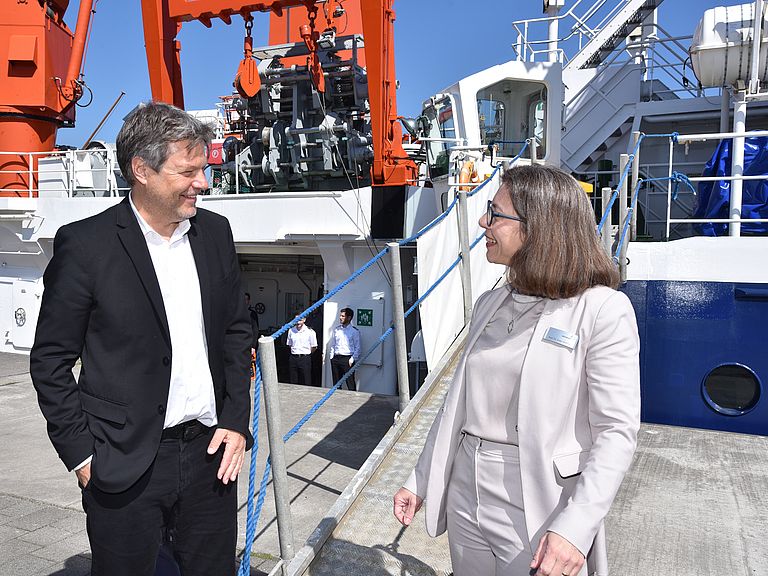
GEOMAR Director Professor Dr. Katja Matthes welcomes Robert Habeck, German Federal Minister of Economic Affairs and Climate Action in front of research vessel ALKOR. Photo: Thomas Eisenkrätzer, GEOMAR
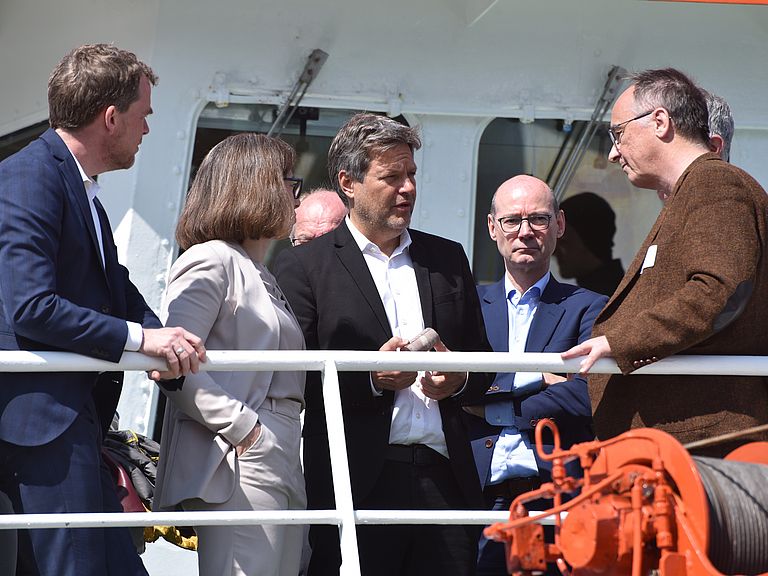
On board research vessel ALKOR, Robert Habeck, Federal Minister for Economic Affairs and Climate Action and GEOMAR researchers exchanged ideas about possibilities for carbon dioxide storage in the ocean. Photo: Thomas Eisenkrätzer, GEOMAR
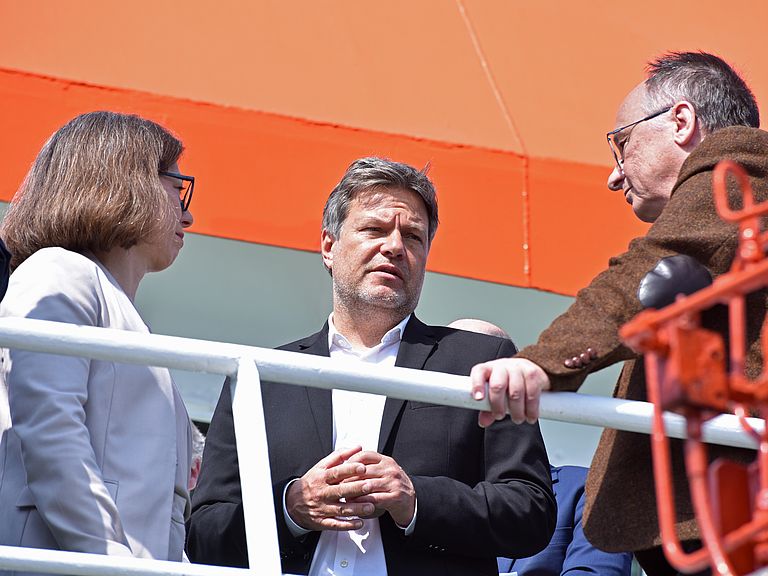
Robert Habeck, Federal Minister for Economic Affairs and Climate Action, with GEOMAR Director Professor Dr. Katja Matthes and Professor Dr. Klaus Wallmann on board research vessel ALKOR. Photo Thomas Eisenkrätzer, GEOMAR
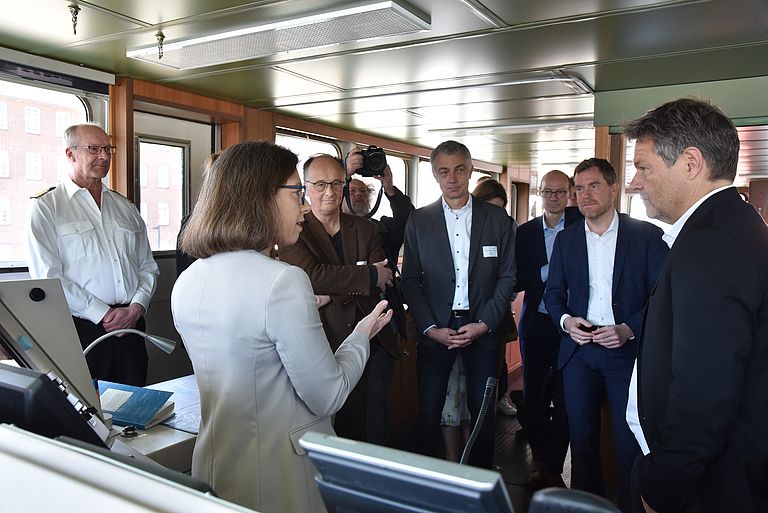
Minister Robert Habeck was particularly interested in GEOMAR's work on possibilities for carbon dioxide storage in the sea floor and the use of lime for alkalinisation and mitigation of ocean acidification. Photo: Thomas Eisenkrätzer, GEOMAR
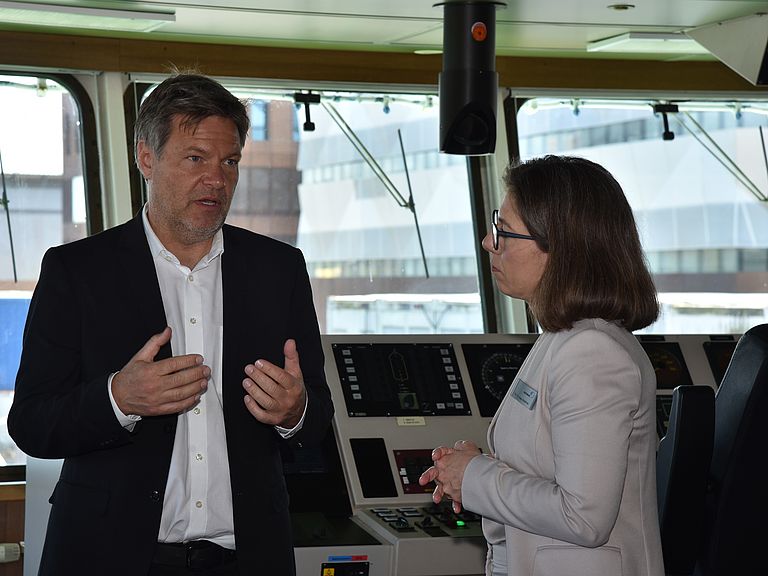
GEOMAR Director Professor Dr. Katja Matthes and Robert Habeck, German Federal Minister for Economic Affairs and Climate Action on board research vessel ALKOR. Photo: Thomas Eisenkrätzer, GEOMAR


